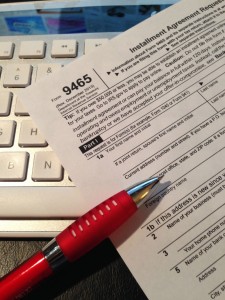
Sometimes you get a big surprise on tax day. You thought you’d get a refund but end up actually owing money.
It’s always best to pay whatever you owe by the filing deadline to avoid penalties and interest being added to the bill but sometimes that’s just not possible.
If that’s the case, here are 3 ways to handle it with the IRS:
- Additional Time – If you think you can pay what you owe in the next 60 to 120 days, you can call the IRS at 800-829-1040 and request additional time. Make sure you have your return in hand when you call. If you want to do it yourself by going to the IRS Online Payment Agreement.
- Pros – Generally you will pay less penalties and interest that you would if you set up an installment agreement with them.
- Cons – Be prepared to sit on the phone while you wait for a representative.
- Installment Agreement – Filing a form 9465 will set up an installment plan for a maximum of 72 months to pay. You can determine how much you can pay each month and on what date you’d like to make your payment. If you owe more than $25,000 (including penalties and interest) you will also have to submit a complete financial statement to determine what your payment will be. Your tax preparer can create and submit this form when he efiles your return. You can pay your installments by check, have them withdrawn directly from your bank account or pay online. You can also submit a form 9465 after your return has been filed.
- Pros – It’s fast and easy to set up payments.
- Cons – The IRS may consider you to have defaulted on the agreement if you do not make payments on time.
The IRS will also charge you a fee of:- $52 for a direct debit agreement;
- $120 for a standard or payroll deduction agreement;
- $43 if your income is below a certain level;
- Pay Using Your Credit Or Debit Card – You can pay what you owe using any major credit or debit cards. This can be accomplished at PayUSATax.com.
- Pros – It’s simple to do and you can make installment payments, balance due payments, prior year and estimated tax payments.
- Cons – You will be charged a fee to use this service. Those fees are:
- Credit card convenience fee: 1.87%*
- Debit card convenience fee: $2.79
- Direct Withdraw From Your Checking Or Savings Account – You can make estimated tax payments or pay your year end tax bill for free at the IRS Direct Pay website.
- Pros – There are no fees and the IRS does not retain a copy of your banking information.
- Cons – None at this time.